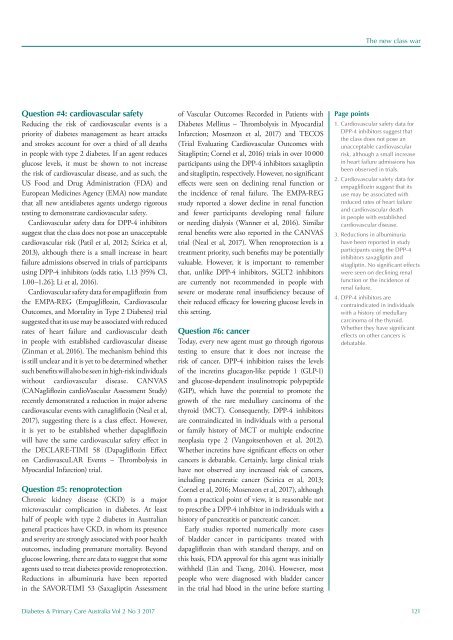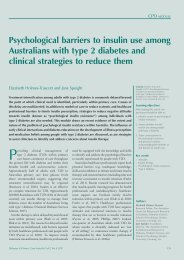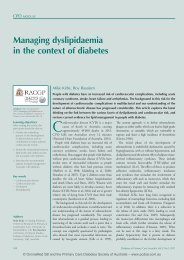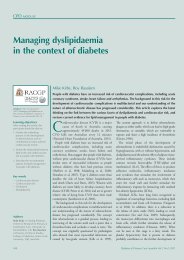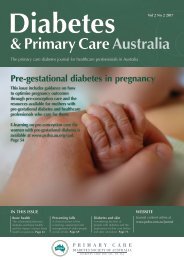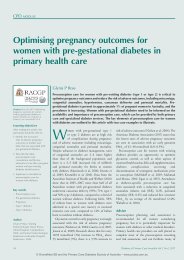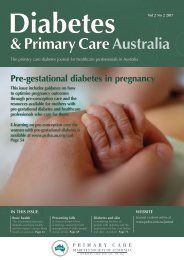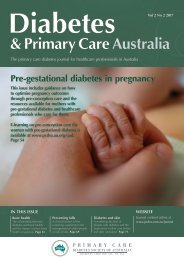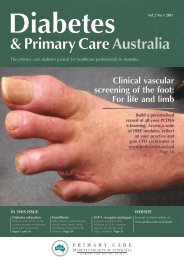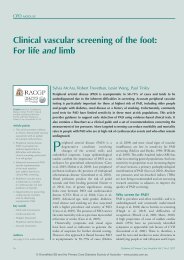DPCA 2-3_entire_v3
Create successful ePaper yourself
Turn your PDF publications into a flip-book with our unique Google optimized e-Paper software.
The new class war<br />
Question #4: cardiovascular safety<br />
Reducing the risk of cardiovascular events is a<br />
priority of diabetes management as heart attacks<br />
and strokes account for over a third of all deaths<br />
in people with type 2 diabetes. If an agent reduces<br />
glucose levels, it must be shown to not increase<br />
the risk of cardiovascular disease, and as such, the<br />
US Food and Drug Administration (FDA) and<br />
European Medicines Agency (EMA) now mandate<br />
that all new antidiabetes agents undergo rigorous<br />
testing to demonstrate cardiovascular safety.<br />
Cardiovascular safety data for DPP-4 inhibitors<br />
suggest that the class does not pose an unacceptable<br />
cardiovascular risk (Patil et al, 2012; Scirica et al,<br />
2013), although there is a small increase in heart<br />
failure admissions observed in trials of participants<br />
using DPP-4 inhibitors (odds ratio, 1.13 [95% CI,<br />
1.00–1.26]; Li et al, 2016).<br />
Cardiovascular safety data for empagliflozin from<br />
the EMPA-REG (Empagliflozin, Cardiovascular<br />
Outcomes, and Mortality in Type 2 Diabetes) trial<br />
suggested that its use may be associated with reduced<br />
rates of heart failure and cardiovascular death<br />
in people with established cardiovascular disease<br />
(Zinman et al, 2016). The mechanism behind this<br />
is still unclear and it is yet to be determined whether<br />
such benefits will also be seen in high-risk individuals<br />
without cardiovascular disease. CANVAS<br />
(CANagliflozin cardioVascular Assessment Study)<br />
recently demonstrated a reduction in major adverse<br />
cardiovascular events with canagliflozin (Neal et al,<br />
2017), suggesting there is a class effect. However,<br />
it is yet to be established whether dapagliflozin<br />
will have the same cardiovascular safety effect in<br />
the DECLARE-TIMI 58 (Dapagliflozin Effect<br />
on CardiovascuLAR Events – Thrombolysis in<br />
Myocardial Infarction) trial.<br />
Question #5: renoprotection<br />
Chronic kidney disease (CKD) is a major<br />
microvascular complication in diabetes. At least<br />
half of people with type 2 diabetes in Australian<br />
general practices have CKD, in whom its presence<br />
and severity are strongly associated with poor health<br />
outcomes, including premature mortality. Beyond<br />
glucose lowering, there are data to suggest that some<br />
agents used to treat diabetes provide renoprotection.<br />
Reductions in albuminuria have been reported<br />
in the SAVOR-TIMI 53 (Saxagliptin Assessment<br />
of Vascular Outcomes Recorded in Patients with<br />
Diabetes Mellitus – Thrombolysis in Myocardial<br />
Infarction; Mosenzon et al, 2017) and TECOS<br />
(Trial Evaluating Cardiovascular Outcomes with<br />
Sitagliptin; Cornel et al, 2016) trials in over 10 000<br />
participants using the DPP-4 inhibitors saxagliptin<br />
and sitagliptin, respectively. However, no significant<br />
effects were seen on declining renal function or<br />
the incidence of renal failure. The EMPA-REG<br />
study reported a slower decline in renal function<br />
and fewer participants developing renal failure<br />
or needing dialysis (Wanner et al, 2016). Similar<br />
renal benefits were also reported in the CANVAS<br />
trial (Neal et al, 2017). When renoprotection is a<br />
treatment priority, such benefits may be potentially<br />
valuable. However, it is important to remember<br />
that, unlike DPP-4 inhibitors, SGLT2 inhibitors<br />
are currently not recommended in people with<br />
severe or moderate renal insufficiency because of<br />
their reduced efficacy for lowering glucose levels in<br />
this setting.<br />
Question #6: cancer<br />
Today, every new agent must go through rigorous<br />
testing to ensure that it does not increase the<br />
risk of cancer. DPP-4 inhibition raises the levels<br />
of the incretins glucagon-like peptide 1 (GLP-1)<br />
and glucose-dependent insulinotropic polypeptide<br />
(GIP), which have the potential to promote the<br />
growth of the rare medullary carcinoma of the<br />
thyroid (MCT). Consequently, DPP-4 inhibitors<br />
are contraindicated in individuals with a personal<br />
or family history of MCT or multiple endocrine<br />
neoplasia type 2 (Vangoitsenhoven et al, 2012).<br />
Whether incretins have significant effects on other<br />
cancers is debatable. Certainly, large clinical trials<br />
have not observed any increased risk of cancers,<br />
including pancreatic cancer (Scirica et al, 2013;<br />
Cornel et al, 2016; Mosenzon et al, 2017), although<br />
from a practical point of view, it is reasonable not<br />
to prescribe a DPP-4 inhibitor in individuals with a<br />
history of pancreatitis or pancreatic cancer.<br />
Early studies reported numerically more cases<br />
of bladder cancer in participants treated with<br />
dapagliflozin than with standard therapy, and on<br />
this basis, FDA approval for this agent was initially<br />
withheld (Lin and Tseng, 2014). However, most<br />
people who were diagnosed with bladder cancer<br />
in the trial had blood in the urine before starting<br />
Page points<br />
1. Cardiovascular safety data for<br />
DPP-4 inhibitors suggest that<br />
the class does not pose an<br />
unacceptable cardiovascular<br />
risk, although a small increase<br />
in heart failure admissions has<br />
been observed in trials.<br />
2. Cardiovascular safety data for<br />
empagliflozin suggest that its<br />
use may be associated with<br />
reduced rates of heart failure<br />
and cardiovascular death<br />
in people with established<br />
cardiovascular disease.<br />
3. Reductions in albuminuria<br />
have been reported in study<br />
participants using the DPP-4<br />
inhibitors saxagliptin and<br />
sitagliptin. No significant effects<br />
were seen on declining renal<br />
function or the incidence of<br />
renal failure.<br />
4. DPP-4 inhibitors are<br />
contraindicated in individuals<br />
with a history of medullary<br />
carcinoma of the thyroid.<br />
Whether they have significant<br />
effects on other cancers is<br />
debatable.<br />
Diabetes & Primary Care Australia Vol 2 No 3 2017 121


